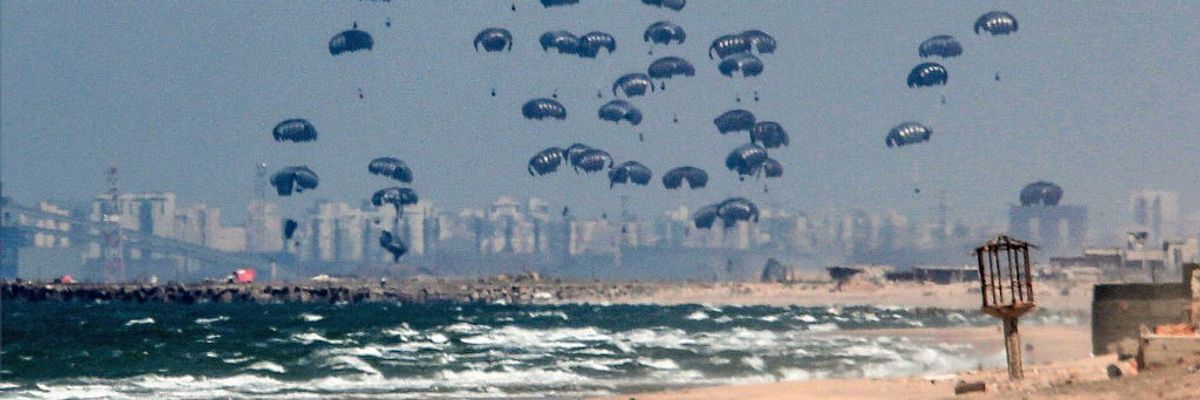Human rights defenders on Tuesday pointed to the drowning deaths of 12 Palestinians trying to retrieve humanitarian aid parcels airdropped off the Gaza shore as yet another reason why Israel must stop blocking aid from entering the embattled strip by land.
Video published on social media shows Palestinians running toward the Mediterranean Sea in Beit Lahia as aid parcels parachute downward. Eyewitness Abu Mohammad toldCNN that the people who drowned "don't know how to swim."
"There were strong currents and all the parachutes fell in the water," Mohammad said. "People want to eat and are hungry. I haven't been able to receive anything."
Ramy Abdu, chair of the Geneva-based group Euro-Mediterranean Human Rights Monitor, said that some of the victims died after becoming entangled in parachute ropes.
According to the U.S. military—which along with Jordan, the United Arab Emirates, Egypt, Germany, the United Kingdom, and Singapore has been airdropping aid into Gaza—parachute malfunctions caused three of the 80 parcels dropped to land in the sea. The Pentagon did not say which country carried out the drop.
Earlier this month, five children were
crushed to death and numerous other Palestinians were injured by U.S.-airdropped parcels on which the parachutes apparently malfunctioned.
The airdrops come amid widespread and increasingly deadly starvation in Gaza, where Israeli forces have been
accused of using hunger as a weapon of war. Last month, Michael Fakhri, the United Nations special rapporteur on the right to food, called Israel's forced starvation of Gazans part of "a situation of genocide" in the besieged enclave, where more than 114,000 Palestinians have been killed or wounded by Israeli forces since October 7 and around 2 million people out of a population of 2.3 million have been forcibly displaced.
While Israel claims there are no limits on aid entering Gaza by land, Israeli officials
said Monday that United Nations Relief and Works Agency for Palestine Refugees in the Near East trucks would be blocked from entering northern Gaza. Israeli forces have repeatedly attacked aid convoys and their police escorts, forcing UNRWA to suspend humanitarian deliveries.
Israeli forces have also on several occasions attacked starving Palestinians as they desperately attempt to get food for their families, including in the February 29 "
Flour Massacre" that left more than 870 Gazans dead or wounded.
Also blocking humanitarian aid from reaching starving Palestinians are Israeli civilians who have camped at border crossings to prevent convoys from entering Gaza. Last month, right-wing extremists
set up a giant inflatable children's bouncy castle where aid trucks are meant to pass through the Kerem Shalom border crossing in an effort to lend a festive atmosphere to the action.
Medical Aid for Palestinians, a London-based humanitarian group, said Tuesday that "airdrops will not end famine and are a dangerous proposed 'solution.'"
Palestinians in Gaza expressed similar sentiments.
"We call for the opening of the crossings in a proper fashion," Mohammad told
CNN, "but these humiliating methods are not acceptable."
